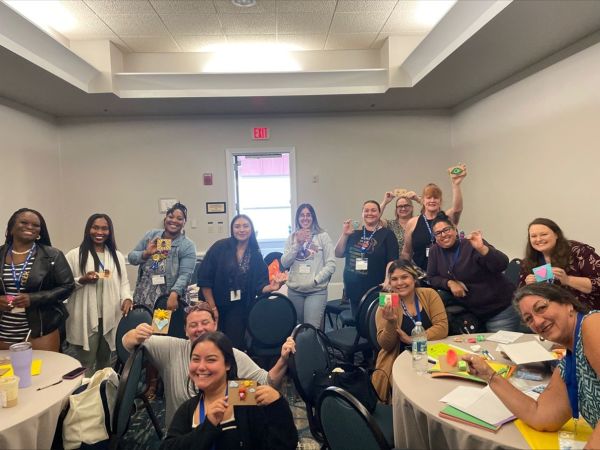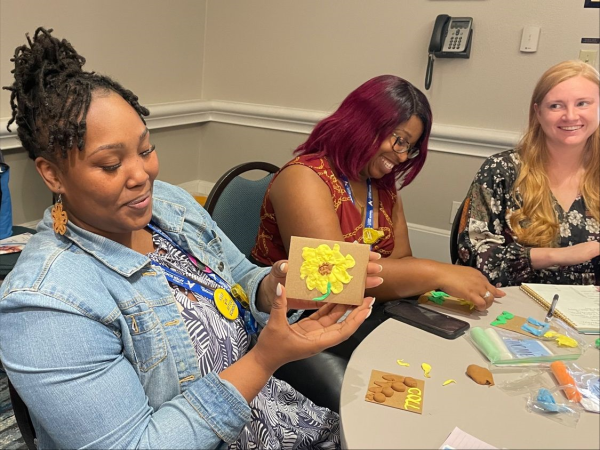November 30, 2023
Their Voice, Their Choice: Ideas for Supporting Youth Engagement
Education leaders share their strategies for centering youth voice and engaging youth to support well-being and belonging.
We know that centering the voices, opinions, and needs of youth is an essential strategy to support the mental health and well-being of children and their families. So, how can schools and community organizations build support for authentic youth-adult partnerships? What’s working when it comes to youth engagement and what’s needed to make sustainable impact?
At the 2023 Florida After School Conference in Orlando, I explored these questions in a workshop titled, “Centering Youth Voice: 5 Simple Activities.” This session was inspired by my keynote presentation at the Kentucky Youth Tobacco Control Conference in Lexington. Fostering connectedness between youth and adults is a key protective factor for young people, supporting their mental and physical well-being.
Below are ideas shared by the audience of youth development and education leaders!
Why youth voice matters
The group started our conversation by brainstorming reasons why amplifying the voices of youth, especially those historically left out of decision-making, is so important:
- “It gives youth autonomy and more decision-making power in their day.”
- “Engaging youth improves youth behavior.”
- “They are the experts in their own stories.”
- “The services they are receiving are for them. So, they should have a say in those services.”
- “Fosters belonging and bonding.”
- “It’s their voice – their choice.”
- “Brings joy.”
- “Creates safe spaces for them to express themselves.”
“It is important that we raise their voices because they will have a different perspective.”
What’s working well?
Next, we discussed what’s currently working well when it comes to youth engagement. What programs, policies, and practices are making a positive impact?
- “Provide options. Youth can choose activities and switch each month.”
- “Use surveys to collect feedback.”
- “Allow students to be part of advisory boards.”
- “Group projects and hands-on learning.”
- “Creating spaces for youth, such as a teen/tween center.”
- “Leadership opportunities.”
- “Focus groups with teens.”
- “Activities that involve physical movement.”
- “Bringing parents into the conversation.”
“Once a week, we can open a suggestion box to read input, questions, concerns, and problems from students.”
What’s Needed?
Our final discussion prompt was to identify what is needed to center youth voice in a sustainable way:
- “Aim to seek feedback in a more streamlined manner.”
- “Fun, food, and funds.”
- “Dedication and more people who believe in the value of youth voice.”
- “Community and administrative support.”
- “Support from coworkers, parents, and caregivers.”
- “Passionate, skilled, and flexible counselors.”
- “More time for solid plans and goals.”
"Training for staff on building relationships, engaging student voice, and workshops for importance of sharing your own voice."
Recommended Resources
- Center for Scholars and Storytellers
- Kohl's Healthy at Home
- Florida After School Conference 2023
- My Brother's Keeper Alliance
- Spark Curriculum
- Young Storytellers: Story Time Toolkit
BONUS: Action-Planning Activity
Use the ideas above (plus your own) to craft a four-sentence elevator pitch that will help you build support. Here’s an example:
- Listening to young people – their ideas, opinions, and concerns – builds trust, fosters belonging, and brings joy.
- Creating change in baby steps is OK! Centering youth voice can be as simple as providing options for activities and allowing youth to change their mind.
- We can consistently raise youth voice if we work together, build buy-in from others, and celebrate successes as a team.
- Caregivers and parents are essential too. By adding simple story-telling activities, like the Young Storytellers I Love Worksheet, at our next community event, we can raise youth (and family) voice.
Share your elevator pitch with me via [email protected] and reach out if you need additional support or resources.



